 Backend Development
Backend Development
 XML/RSS Tutorial
XML/RSS Tutorial
 Detailed explanation of XML Schema full-touch graphic and text code
Detailed explanation of XML Schema full-touch graphic and text code
Detailed explanation of XML Schema full-touch graphic and text code
Content summary: XML Schema, like DTD, is responsible for defining and describing the structure and content schema of XML documents. It can define which elements and relationships between elements exist in the XML document, and can define the data types of elements and attributes .
What is XML Schema
XML Schema, like DTD, is responsible for defining and describing the structure and content schema of XML documents. It can define which elements and relationships between elements exist in the XML document, and can define the data types of elements and attributes.
XML Schema itself is an XML document, which conforms to the XML syntax structure. It can be parsed with a common XML parser.
Why use Schema
We have already used DTD to define an XML structure and data type, so why do we need Schema?
Because DTD has many defects :
1) DTD is based on regular expressions and has limited description capabilities;
2) DTD does not have data type support and is insufficient in most application environments ;
3) DTD's constraintsdefinition capabilities are insufficient to make more detailed semantic restrictions on XML instance documents;
4) The structure of DTD is not structured enough and cannot be reused The cost is relatively high;
5) DTD does not use XML as a description method, and there is no standardprogramminginterface for the construction and access of DTD, and standards cannot be used Programmatically perform DTD maintenance.
XML Schema is designed to address the shortcomings of these DTDs. The advantages of XML Schema are:
1) XML Schema is based on XML and has no special syntax
2) XML can be parsed and processed like other XML files
3) XML Schema supports a series of data types (int, float, Boolean, date, etc.)
4) XML Schema provides extensible Data model.
5) XML Schema supports comprehensive namespace
6) XML Schema supports attribute groups.
A simple XML Schema document
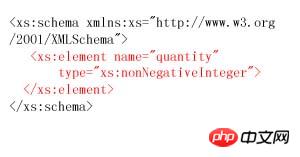
#An element is defined in this Schema: quantity, its type is nonNegativeInteger (non-negative integer), xmlns It is the namespace of Schema, which has been described in Part 3 above.
The following XML fragment is legal:
<quantity>5</quantity>
The following XML fragment is illegal:
<quantity>-4</quantiy>
Types in Schema
Schema mainly includes Three components: element, attribute, and notation.
These three basic components can also be combined into the following components:
a) Type definition components: simple types and composite types
b) Assembly components
c) Attribute component
Simple type
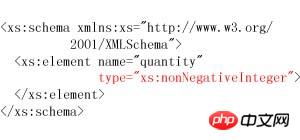
XML Schema defines some built-in data types that can be used to describe elements content and attribute values.
If an element only contains numbers, strings or other data, but does not include sub-elements, this is called a simple type.
As shown in the figure, the element quantity is a simple type. Its element content must be a non-negative integer, excluding any attributes and sub-elements.
<quantity>some</quantity>
All built-in simple types
Primitive types
string,boolean,decimal,float,double,duration datetime,time,date,gYearMonth,gYear,gMonthDay, dDay,gMonth,hexBinary,base64Binary,any URI,QName NOTATION
Derived types (base types in brackets)
normalizedString(string),language(tonken),token(normalizedString) NMTOKEN(token),Name(token),NCName(Name),ID(NCName),IDREF(NCName) IDREFS(list of IDREF),ENTITY(NCName),ENTITIES(list of ENTITY) integer(decimal),nonPositiveInteger(integer), negativeInteger(noPositiveInteger),long(integer),int(long), short(int),byte(short),nonNegativeInteger(integer) unsignedLong(nonNegativeInteger),unsignedInt(unsignedLong), unsignedShort(unsignedInt),unsignedByte(unsignedShort), positiveInteger(nonNegativeInteger)
Creating simple types
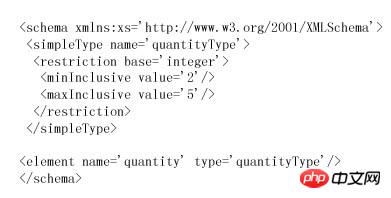
In the figure, we first create a simple type: quantityType, which inherits from integer. minInclusive and maxInclusive define its minimum value 2 and maximum Value 5. Finally, we define the type of element quantity as quantityType.
正确: <quantity>3</quantity> 错误: <quantity>10</quantity> <qauntity>aaa</quantity>
Using restriction, we can limit the acceptance of certain values or only certain text,
基本方面:equal,ordered,bounded,cardinality,numeric 限制方面:length,minLength,maxLength pattern,enumeration whiteSpace maxInclusive,maxExclusive,minInclusive,minExclusive totalDigits,fractionDigits
Simple type example 1
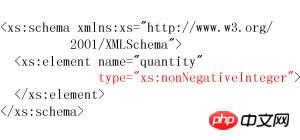
The value of this SKU type: 3 numbers followed by a hyphen followed by two uppercase English letters.
pattern is followed by a regular expression. See other books for regular expression syntax.
正确: <ourSKU>123-AB</ourSKU> 错误: <ourSKU>abc-AB</ourSKU> <ourSKU>123-ab</ourSKU>
Simple type example 2
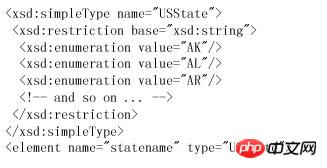
#This is a type USState used to describe the names of American states. All state names are listed through enumeration. Take When the value is entered, only the state names listed in it can be taken.

Hot AI Tools

Undresser.AI Undress
AI-powered app for creating realistic nude photos

AI Clothes Remover
Online AI tool for removing clothes from photos.

Undress AI Tool
Undress images for free

Clothoff.io
AI clothes remover

AI Hentai Generator
Generate AI Hentai for free.

Hot Article

Hot Tools

Notepad++7.3.1
Easy-to-use and free code editor

SublimeText3 Chinese version
Chinese version, very easy to use

Zend Studio 13.0.1
Powerful PHP integrated development environment

Dreamweaver CS6
Visual web development tools

SublimeText3 Mac version
God-level code editing software (SublimeText3)

Hot Topics
 1386
1386
 52
52
 Can I open an XML file using PowerPoint?
Feb 19, 2024 pm 09:06 PM
Can I open an XML file using PowerPoint?
Feb 19, 2024 pm 09:06 PM
Can XML files be opened with PPT? XML, Extensible Markup Language (Extensible Markup Language), is a universal markup language that is widely used in data exchange and data storage. Compared with HTML, XML is more flexible and can define its own tags and data structures, making the storage and exchange of data more convenient and unified. PPT, or PowerPoint, is a software developed by Microsoft for creating presentations. It provides a comprehensive way of
 Using Python to merge and deduplicate XML data
Aug 07, 2023 am 11:33 AM
Using Python to merge and deduplicate XML data
Aug 07, 2023 am 11:33 AM
Using Python to merge and deduplicate XML data XML (eXtensibleMarkupLanguage) is a markup language used to store and transmit data. When processing XML data, sometimes we need to merge multiple XML files into one, or remove duplicate data. This article will introduce how to use Python to implement XML data merging and deduplication, and give corresponding code examples. 1. XML data merging When we have multiple XML files, we need to merge them
 Convert XML data to CSV format in Python
Aug 11, 2023 pm 07:41 PM
Convert XML data to CSV format in Python
Aug 11, 2023 pm 07:41 PM
Convert XML data in Python to CSV format XML (ExtensibleMarkupLanguage) is an extensible markup language commonly used for data storage and transmission. CSV (CommaSeparatedValues) is a comma-delimited text file format commonly used for data import and export. When processing data, sometimes it is necessary to convert XML data to CSV format for easy analysis and processing. Python is a powerful
 Filtering and sorting XML data using Python
Aug 07, 2023 pm 04:17 PM
Filtering and sorting XML data using Python
Aug 07, 2023 pm 04:17 PM
Implementing filtering and sorting of XML data using Python Introduction: XML is a commonly used data exchange format that stores data in the form of tags and attributes. When processing XML data, we often need to filter and sort the data. Python provides many useful tools and libraries to process XML data. This article will introduce how to use Python to filter and sort XML data. Reading the XML file Before we begin, we need to read the XML file. Python has many XML processing libraries,
 Import XML data into database using PHP
Aug 07, 2023 am 09:58 AM
Import XML data into database using PHP
Aug 07, 2023 am 09:58 AM
Importing XML data into the database using PHP Introduction: During development, we often need to import external data into the database for further processing and analysis. As a commonly used data exchange format, XML is often used to store and transmit structured data. This article will introduce how to use PHP to import XML data into a database. Step 1: Parse the XML file First, we need to parse the XML file and extract the required data. PHP provides several ways to parse XML, the most commonly used of which is using Simple
 Python implements conversion between XML and JSON
Aug 07, 2023 pm 07:10 PM
Python implements conversion between XML and JSON
Aug 07, 2023 pm 07:10 PM
Python implements conversion between XML and JSON Introduction: In the daily development process, we often need to convert data between different formats. XML and JSON are common data exchange formats. In Python, we can use various libraries to convert between XML and JSON. This article will introduce several commonly used methods, with code examples. 1. To convert XML to JSON in Python, we can use the xml.etree.ElementTree module
 Handling errors and exceptions in XML using Python
Aug 08, 2023 pm 12:25 PM
Handling errors and exceptions in XML using Python
Aug 08, 2023 pm 12:25 PM
Handling Errors and Exceptions in XML Using Python XML is a commonly used data format used to store and represent structured data. When we use Python to process XML, sometimes we may encounter some errors and exceptions. In this article, I will introduce how to use Python to handle errors and exceptions in XML, and provide some sample code for reference. Use try-except statement to catch XML parsing errors When we use Python to parse XML, sometimes we may encounter some
 Python parsing special characters and escape sequences in XML
Aug 08, 2023 pm 12:46 PM
Python parsing special characters and escape sequences in XML
Aug 08, 2023 pm 12:46 PM
Python parses special characters and escape sequences in XML XML (eXtensibleMarkupLanguage) is a commonly used data exchange format used to transfer and store data between different systems. When processing XML files, you often encounter situations that contain special characters and escape sequences, which may cause parsing errors or misinterpretation of the data. Therefore, when parsing XML files using Python, we need to understand how to handle these special characters and escape sequences. 1. Special characters and



